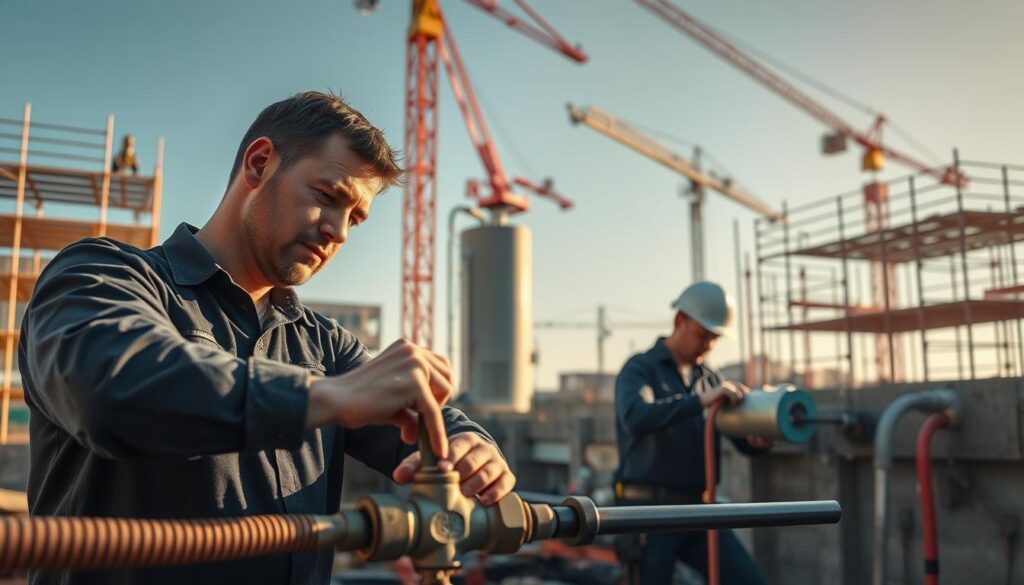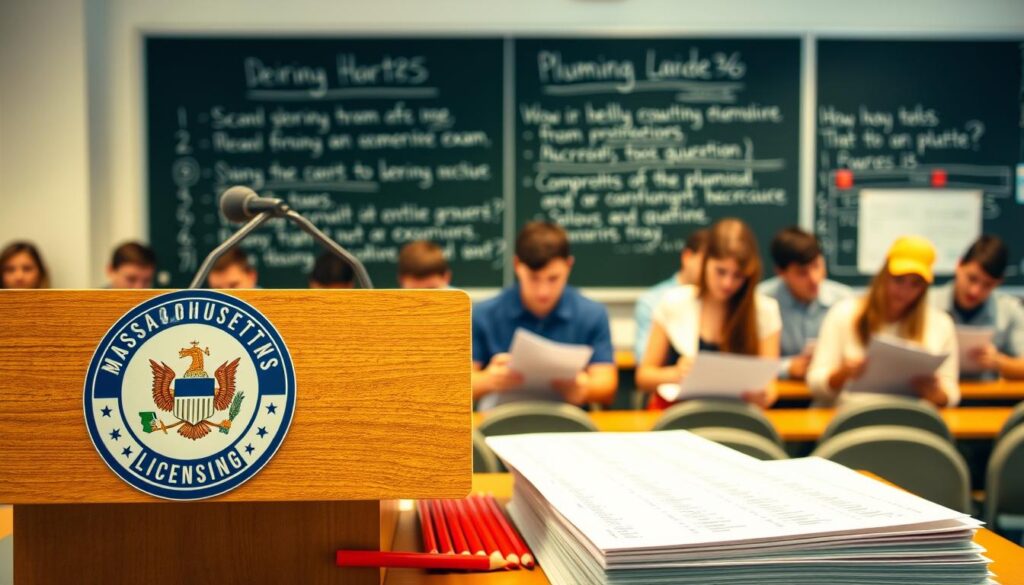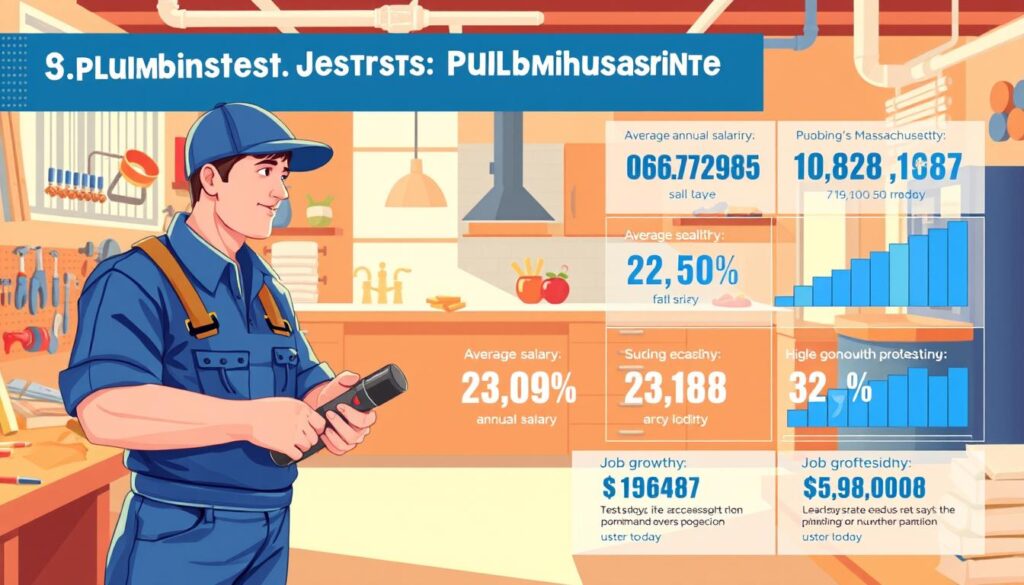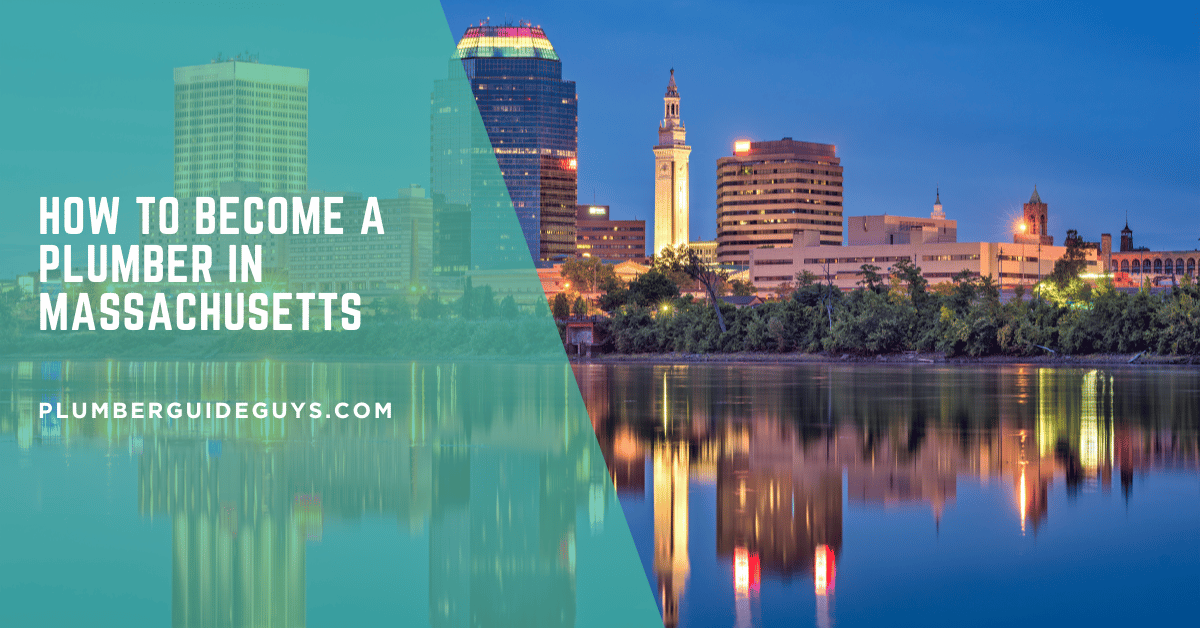Affiliate Disclosure
Plumber Guide Guys is a participant in the Amazon Services LLC Associates Program, an affiliate advertising program designed to provide a means for sites to earn advertising fees by advertising and linking to Amazon.
How to Become a Plumber in Massachusetts? Did you know plumbers in Massachusetts can make up to $86,240 a year? The top 10% earn even more. Plumbing is a great career for those looking for stability and good pay in the Bay State.

To become a plumber in Massachusetts, you need to follow a set path. The state has strict rules to make sure plumbing services are top-notch. These rules are set by the Board of State Examiners of Plumbers and Gas Fitters.
If you want to be a plumber in Massachusetts, you must go through a detailed licensing process. This includes education, apprenticeship, and getting certified. It’s a lot of work, but it’s worth it.
This guide will show you how to start your plumbing career. We’ll cover the different licenses, what education you need, and the job opportunities in Massachusetts.
Key Takeaways
- Massachusetts requires three distinct plumbing license levels
- Comprehensive training and apprenticeship are mandatory
- Potential annual earnings can reach $86,240
- State regulation ensures high professional standards
- Multiple career pathways exist within the plumbing profession
Table of Contents
Understanding Massachusetts Plumbing License Requirements
Getting a plumbing license in Massachusetts needs you to know the state’s rules well. You’ll learn about a system that checks if you’re ready to work as a plumber. This system keeps everyone safe and makes sure plumbers are good at their job.
The rules for getting a plumbing license in Massachusetts are clear. They help new plumbers learn and grow. You’ll need to study hard, get hands-on experience, and be dedicated.
State Licensing Authority and Regulations
The Board of State Examiners of Plumbers and Gas Fitters manages plumbing licenses in Massachusetts. They make sure apprentices and licensed plumbers follow strict rules. This helps keep everyone safe and the work up to standard.
Types of Plumbing Licenses Available
There are three main plumbing licenses in Massachusetts:
- Apprentice Plumber: For those just starting out
- Journeyman Plumber: For those with more experience
- Master Plumber: The top level of certification
Basic Eligibility Requirements
To get a plumbing license in Massachusetts, you must meet certain requirements. Here’s what you need to know:
| License Type | Minimum Age | Education Requirements | Experience Needed |
|---|---|---|---|
| Apprentice | 18 years | High School Diploma | None |
| Journeyman | 18 years | Completed Apprenticeship | 4,000 work hours |
| Master | 21 years | Journeyman License | 2 years as Journeyman |
Knowing the rules for plumbing licenses in Massachusetts is key for a career in plumbing. Each step builds on the last, helping you grow professionally.
How to Become a Plumber in Massachusetts: A Step-by-Step Guide
Starting a career as a plumber in Massachusetts takes hard work and a clear plan. The path to becoming a licensed plumber is detailed and includes key steps that will shape your career.
- Apprenticeship Entry: Start by joining an approved apprenticeship program. You must be at least 18 with a high school diploma or GED.
- Technical Training: Finish the required classroom hours in plumber certification MA standards. This usually means 144 hours a year.
- Practical Experience: Gain 8,000 hours of on-the-job training under a licensed professional’s watch.
- Journeyman Licensing: After your apprenticeship, apply for your journeyman plumber license with the Massachusetts Board of State Examiners of Plumbers and Gas Fitters.
“Success in the plumbing trade is about continuous learning and mastering both technical skills and professional standards.” – Massachusetts Plumbing Professional Association
Becoming a licensed plumber in Massachusetts takes about five years. You’ll learn important skills like pipe installation, repair, system design, and safety. These skills are key to meeting Massachusetts’ strict standards.
Your goal is to gain deep knowledge and practical experience. This ensures you become a skilled, recognized plumber in Massachusetts.
Massachusetts Plumber Education and Training Programs
Starting a career in plumbing needs the right education and training. In Massachusetts, you can find many ways to learn plumbing. There are trade schools and apprenticeships ready to help you succeed.
Approved Technical Schools and Programs
In Massachusetts, you can choose from many schools for plumbing training. These places teach you the technical skills and hands-on abilities needed to be a pro plumber.
- Massachusetts community colleges with vocational programs
- Technical institutes specializing in trade education
- Professional training centers focusing on plumbing skills
Vocational High School Options
Many high schools in Massachusetts offer plumbing courses. These classes teach the basics and give you a start in your plumbing career.
Apprenticeship Training Requirements
Apprenticeships in Massachusetts are detailed and structured. The state sets strict training rules to ensure you get top-notch skills.
| Training Component | Required Hours | Duration |
|---|---|---|
| Plumbing Theory | 550 clock hours | Minimum 4 years |
| Practical Work Experience | 8,000 hours | Supervised on-job training |
| Gas-Fitting Training | Integrated within theory hours | Specialized certification |
Choosing an accredited plumbing apprenticeship program in Massachusetts is key. These programs mix classroom learning with real-world experience. They prepare you for a rewarding career in plumbing.
Licensing Examination Process and Requirements
To get your plumber certification in Massachusetts, you must pass a licensing exam. The state has a detailed testing system. It checks if you’re ready to work in the plumbing field.

PSI Exams gives the official tests for Massachusetts plumbers. You’ll need to study hard to pass. The exam tests your knowledge of the plumbing code and professional skills.
Exam Preparation Strategies
- Study the latest Massachusetts plumbing regulations
- Review technical manuals and code books
- Take practice tests to assess your knowledge
- Attend preparatory workshops
The exam costs about $80. You must score 70% or better to pass. Your test will check if you know:
| Exam Component | Focus Area | Percentage |
|---|---|---|
| Technical Knowledge | Plumbing Systems | 40% |
| Code Compliance | Massachusetts Plumbing Code | 30% |
| Safety Regulations | Professional Standards | 20% |
| Practical Applications | Problem-Solving | 10% |
Pro tip: Schedule your exam when you can study a lot. This will help you pass.
“Preparation is the key to passing your plumbing certification exam in Massachusetts.” – Professional Plumbing Association
Once you pass, you’ll get your official certification. Keep your skills up to date with the latest plumbing code.
Work Experience and Apprenticeship Requirements
To become a licensed plumber in Massachusetts, you need to know about work experience and apprenticeships. Plumbing apprenticeships in Massachusetts help you learn important skills. They also help you meet state licensing needs.
Required Hours of Practical Experience
To get a plumber license in Massachusetts, you must have a lot of practical experience. The state has specific rules for different levels of licenses:
- Apprentice plumbers need to complete 6,800 hours of work experience
- Journeyman plumbers must have 1,700 hours more experience to apply for a master plumber license
- Work hours must be under a licensed master or journeyman plumber’s supervision
Supervision Requirements
Getting the right supervision is key in Massachusetts. Apprentices must work with experienced plumbers. These professionals help with skill development and follow state rules.
| License Level | Required Supervision | Work Hours |
|---|---|---|
| Apprentice | Direct master/journeyman oversight | 6,800 hours |
| Journeyman | Independent work with periodic review | 1,700 additional hours |
Documentation and Verification Process
Keeping accurate records is vital in Massachusetts plumbing apprenticeships. You’ll need to keep detailed logs of your work experience. This includes:
- Supervisor contact information
- Dates and hours worked
- Types of plumbing tasks done
- Signed verification forms from supervising plumbers
By following these steps, you’ll meet the work experience needs. This will help you get your professional plumbing license in Massachusetts.
Massachusetts Plumber Salary and Career Outlook

Thinking about becoming a plumber in Massachusetts? You’ll find the job offers good pay and promising future. Plumbers in Massachusetts earn well, with salaries that grow as you gain experience.
The U.S. Bureau of Labor Statistics says plumbers in Massachusetts make about $89,140 a year. This high salary shows the state’s strong construction industry and need for skilled workers.
| Career Stage | Estimated Annual Salary |
|---|---|
| Apprentice Plumber | $35,000 – $45,000 |
| Journeyman Plumber | $65,000 – $80,000 |
| Master Plumber | $85,000 – $110,000 |
Being part of a plumber union in Massachusetts can really help your career. Union members get:
- Higher wages
- Great benefits
- Training programs
- Job security and networking
The future looks bright for plumbers in Massachusetts. The job is expected to grow 7% from 2023 to 2033. This growth comes from big projects, new homes, and the need for skilled maintenance workers.
What affects your salary in Massachusetts includes:
- Where you live in the state
- How long you’ve been working
- Any special certifications you have
- The kind of work you do (homes, businesses, factories)
By improving your skills and maybe joining a union, you can have a rewarding and stable career in plumbing.
Licensing Costs and Financial Considerations
Starting a plumbing career in Massachusetts means spending money. Knowing the costs helps you plan your budget. These expenses cover different parts of your career.
When you plan your plumbing career, you’ll face several costs. These are needed to get and keep your professional credentials.
Application and Exam Fees
The licensing process has several financial steps:
- Journeyman Plumber License Application: $31
- PSI Professional Examination Fee: $80
- Initial License Issuance: $52
Education and Training Expenses
Getting educated is key for success in plumbing. The cost depends on your choice:
- Technical School Programs: $5,000 – $15,000
- Apprenticeship Programs: Often low-cost or sponsored by employers
- Vocational Training: Potentially subsidized by state programs
License Renewal Costs
Keeping your plumbing license up to date costs money:
- Journeyman Plumber Renewal: $52
- Master Plumber Renewal: $78
- Renewal Cycle: Typically every 2-3 years
Planning your finances and knowing the requirements helps. Look into scholarships or training paid by employers to manage costs.
Starting Your Own Plumbing Business in Massachusetts
Starting a plumbing business in Massachusetts needs careful planning and following state rules. As a master plumber, you must understand the licensing and business rules to grow your business.
To legally run your plumbing business, you need a Plumbing Business License from the state. The steps to get it are:
- Secure your master plumber massachusetts license
- Register your business with the Secretary of State
- Submit a completed application for a Plumbing Corporation License
- Provide a stamped copy of your business Articles of Organization
Knowing the Massachusetts plumbing code is vital for your business. You must keep up with state rules and know local building codes well.
Important business things to think about include:
- Get good business insurance
- Make a strong marketing plan
- Create a professional website
- Connect with local contractors and property managers
Getting ready financially is important for starting your business. Plan for initial costs like:
- Licensing fees
- Professional equipment
- Marketing materials
- Initial operating costs
Pro tip: Build a strong reputation by providing great service and following the Massachusetts plumbing code closely.
Success in the plumbing business comes from technical skill, professionalism, and a dedication to learning.
Conclusion
Becoming a plumber in Massachusetts is a rewarding career. It requires dedication to learn the trade well. You must understand the state’s licensing rules and finish training programs.
Your success in plumbing depends on following the state’s steps. You’ll need to finish school and get practical experience through apprenticeships. Each step helps you prepare for a stable and possibly lucrative job. You’ll also learn skills that can lead to starting your own business.
Seeing plumbing as a career is more than just a job. It’s a chance to help communities and solve big infrastructure problems. By keeping up with education and industry standards, you can build a fulfilling career in plumbing in Massachusetts.
Starting your plumbing journey is an investment in yourself. The state’s training and licensing make sure you’ll be skilled in this important trade. Whether you’re new or looking to grow, Massachusetts offers a clear path to success in plumbing.

